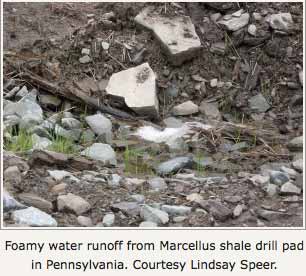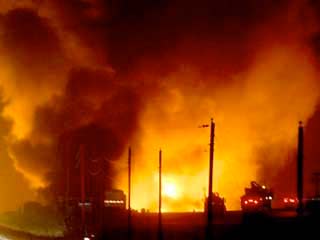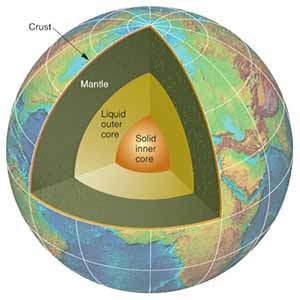Biblio
Congress isn’t going to regulate hydraulic fracturing any time soon. But the Department of Interior might.
For starters, Interior is mulling whether it should require drilling companies to disclose the chemicals they use to frack wells drilled on public lands, and already the suggestion has earned Interior Secretary Ken Salazar an earful.
On January 5, a bipartisan group of 32 members of Congress, who belong to the Natural Gas Caucus, sent Salazar a letter imploring him to resist a hasty decision because more regulations would “increase energy costs for consumers, suppress job creation in a promising energy sector, and hinder our nation’s ability to become more energy independent.”
A week later, 46 House Democrats followed up by signing a letter to Salazar urging him to at least adopt the disclosure requirement because, as Rep. Maurice Hinchey, D-N.Y., said, “communities across America have seen their water contaminated by the chemicals used in the hydraulic fracturing process.”
"The public has a right to know what toxins might be going into the ground near their communities, and what might be leaking into their drinking water," said the letter, which was sent by the three initial sponsors of now-stalled legislation to regulate fracturing, Hinchey, Rep. Jared Polis, D-Colo., and Rep. Diana DeGette, D-Colo.
...According to Hinchey’s office, disclosure on federal lands would set an important precedent, because that information would become part of the public record and, when combined with state-based disclosure rules, “would provide a great deal of useful information for those concerned with the risks these chemicals may pose.”
See: ProPublica Series. "Buried Secrets: Gas Drilling's Environmental Threat".
People who visited eastern Utah’s vast open spaces last winter might have thought they were doing their lungs a big favor by taking a deep breath of fresh, country air. But it turns out, they would have been better off going to Los Angeles or most other major cities.
According to new air-pollution data, breathing air around the oil and gas fields of the remote Uinta Basin was “unhealthy” on 40 days this past winter.
The problem was on par with the worst summertime ozone tracked by the U.S. Environmental Protection Agency (EPA) in the nation’s most polluted place, San Bernardino County, Calif. In addition, Uintah County’s ozone topped the worst high-ozone days in Salt Lake City and even industrial hubs such as Houston and Los Angeles.
See: The Case for a Truth and Reconciliation Commission on Toxic Hazards
See: Fracking: Implications for Human and Environmental Health
See: Living Downstream: An Ecologist's Personal Investigation of Cancer and the Environment
While our nation copes with the disaster in the Gulf of Mexico and the multiple failures of offshore drilling regulation that led to it, another potential fossil-fuel crisis lurks onshore.
Hydraulic fracturing, also known as "fracking," injects tens of thousands of gallons of water, sand, and chemicals at high pressure into underground rock formations to release natural gas. The injected fracking fluids are known to include a variety of harmful chemicals, such as diesel fuel, benzene, methanol, and formaldehyde. Even low concentrations of these chemicals can have severe health and environmental consequences, and they are being used near drinking water supplies...
...Some in the industry have said disclosure would reveal proprietary data. On the contrary, just as Coca-Cola must disclose a list of ingredients but not the details of its secret formula, our proposal would ask energy companies to share the ingredients of their fracking fluids but not the specific recipes.
Others have opposed federal regulation on the grounds that state regulations are sufficient. However, only a handful of states have fracking-fluid disclosure requirements, and some don't make the data public.
See opposing viewpoint from Energy in Depth, "House Call on the FRAC Act".
Photo: WBAI | Law and Disorder Radio. March 16, 2009.
Theater and film director Josh Fox's documentary Gasland explores the new generation of natural gas drilling, which for a decade has been blasting its way east across the country, tapping shale formations from the Rockies to Pennsylvania, and is now expanding in New York.
Fox is only 37, but he is a veteran explorer of complex themes from militarism to war to globalization and torture who skillfully blends artistry and social message. Gasland is more straightforward than Fox's earlier experimental mixes of theater, dance, music and film, but no less striking.
Nora Eisenberg holds a PhD from Columbia University in English and Comparative Literature and directs the City University of New York's Faculty Fellowship Publication Program for emerging scholars.
Native Americans like the Onondaga, a member nation of the Haudenosaunee Iroquois Confederacy and long leaders as healers of the environment face a new threat: hydraulic fracturing, or fracking.
Complaints have soared as fracking has expanded across the country. “Every state where this is going on, people’s water is contaminated,” said Joseph Heath, general legal counsel to the Onondaga Nation.
“The permanent disruption of peoples’ homes, lives, and communities is heartbreaking,” said Jeanne Shenandoah, Eel Clan elder and member of the Haudenosaunee Environmental Task Force who, with several HETF representatives and Onondaga members visited communities impacted by fracking.
“It impacts huge amounts of land and creates roads through forests and fields. Spills and waste ponds pollute the surface of the land, and the water. Drilling accidents allow gas to migrate into peoples’ water wells and homes. Hundreds of trucks speed down narrow roads every day.”
Shenandoah said when the air coming from these sites gives people headaches and health problems, “you know it’s being polluted too. This cannot be allowed, for the sake of all living things.”
Mother Earth Journal is a project of environmental news reporter Terri Hansen. She welcomes your comments, and queries, or email feedback@motherearthjournal.org.
See: Indigenous Environmental Network
"A network of Indigenous Peoples empowering Indigenous Nations and communities towards sustainable livelihoods, demanding environmental justice and maintaining the Sacred Fire of our traditions."
The Oil Region Alliance of Business, Industry & Tourism (ORA) administers the Oil 150. The ORA is the manager of the Oil Region National Heritage Area.
The mission of ORA is to increase the prosperity and population of the Oil Region National Heritage Area, through the preservation, promotion, development and support of destinations within the Oil Region National Heritage Area.
This project was financed in part by a Pennsylvania Heritage Parks Program Grant from the Pennsylvania Department of Conservation and Natural Resources, Bureau of Recreation and Conservation, via Oil Region Alliance of Business, Industry & Tourism. Additional funding was furnished by the National Parks Service, the Oil Region Alliance, and the Petroleum History Institute.
The way natural gas promoters talk about their pet fuel, you’d think it was green as clover and safe as baby oil. After the deadly San Bruno, California, gas line explosion, however, hawkers like natural gas billionaire T. Boone Pickens have gone silent. No more calls to action and pleas to phone your member of Congress to demand bigger subsidies.
The quiet is welcome. Let’s use that space to talk about all of the drawbacks. We know how explosive plain old natural gas is (the photo here is of a 2007 blast–they’re not so rare), and we know that we have no idea where those big, aging pipelines are. National security and all that.
But it doesn’t stop there. The current rage in natural gas extraction is deep-drilling in shale formations, mostly in the Northeast and the West. Its dangers have been soberly reported, mostly by the online investigative website ProPublica. But even reports of flammable gas instead of water coming out of kitchen faucets in drilling areas doesn’t fire the imagination like 100-foot flames and victims so incinerated they can’t be found.
The deep drilling, called “fracking,” puts drinking water supplies at risk. It trashes the landscape, and uses vast amounts of fresh water, most of which cannot be reclaimed, to force the gas upward.
If, as Mr. Pickens hopes, Americans will take to automobiles powered by heavily subsidized natural gas, your local “gas” station would be a big potential neighborhood bomb. Some of that natural gas would have to be imported (yep, just like oil), in the form of heavily compressed liquefied natural gas, stored in gigantic tanks near shore or onshore until it’s warmed up and sent through a pipeline.
WASHINGTON, D.C., April 1st, 2010 -- In addition to opening up vast areas of our coastline to offshore oil drilling, the Obama administration yesterday elected to defend a Bush-era policy that allows unlimited amounts of our nation's treasured public lands to be used as toxic waste dumps for the multinational hardrock mining industry.
This decision -- in the form of a response to federal litigation filed by a coalition of conservation and Native American groups -- is completely inconsistent with earlier remarks by Interior Secretary Ken Salazar on the importance of updating our federal mineral policies to protect public lands.
"Increased oil and gas drilling off our coasts, and now unlimited toxic waste dumping on our public lands send the message that profits are more important than water, wildlife and communities," said Lauren Pagel, Policy Director for EARTHWORKS, one of the plaintiffs in the case against the regulations. She continued, "With this move the Obama administration, like the Bush administration before it, is abandoning clean water and communities in favor of gifts to extractive industries."
"The administration has claimed support for reforming one of the most outdated laws on the books -- the 1872 Mining Law -- yet they choose to perpetuate the gross giveaways to an already subsidized industry without regard for other valuable uses of the public's land," said Pagel.
She continued, "It's time for the Obama administration to walk their talk when it comes to our shorelines and our public lands, and responsibly balance resource extraction with protections for communities and taxpayers," said Pagel.
The Obama administration has decided against pressing for a temporary halt to Marcellus Shale drilling in Pennsylvania and New York, a key federal official said.
Brig. Gen. Peter "Duke" DeLuca, commander of the North Atlantic Division of the Army Corps of Engineers, last week declined a request from Rep. Maurice Hinchey (D-N.Y.) to use the federal government's vote on the Delaware River Basin Commission (DRBC) to seek a temporary ban on gas production in the Delaware watershed.
Hinchey wants drilling there to wait until the commission completes a "cumulative impact statement," but DeLuca said that could delay drilling for years...
...Hinchey wrote DeLuca on Sept. 9, saying he was alarmed that the DRBC is preparing to finish regulations -- which would allow production to start -- this year, before a cumulative impact study could even start. He asked DeLuca to use his seat on the commission to advocate for blocking development until after the study is done.
"It is difficult to understand how the DRBC can consider the release of gas drilling regulations without a comprehensive assessment of the possible impacts in the Delaware River Basin," Hinchey wrote...
Environmentalists say DeLuca is wrong when he asserts that the DRBC must balance environmental concerns with economic development. Jill Wiener, a leader of an upstate New York group called Catskills Citizens for Safe Energy, said the commission's mandate is to protect water quality.
"They owe their fealty to the river and the people of the basin," Wiener said, "not the economic health of a few leaseholders and multinational corporations."
But industry officials say DeLuca was correct to reject Hinchey's request.
"Just to be clear here, Hinchey was trying to use a federal agency to direct the actions of a regional water board for the purposes of preventing the development of natural gas in a state where he doesn't even live," said Chris Tucker, spokesman for Energy in Depth, a group of independent drillers. "Next thing you know, he'll be ordering the Army Corps to build levees around our well sites in Wyoming."
Earthworks' Oil & Gas Accountability Project works with tribal, urban and rural communities to protect their homes and the environment from the devastating impacts of oil and gas development.
See: Patrick Reis. NYT. Oct. 6, 2010. "W.Va. Sues Obama, EPA Over Mining Coal Regulations."
See also:
Wiseman, Hannah J. “Untested Waters: The Rise of Hydraulic Fracturing in Oil and Gas Production and the Need to Revisit Regulation.” Fordham Environmental Law Review 20 (2009): 115-170.
Horwitt, Dusty. "Drilling Around the Law: Drinking Water Threatened by Toxic Natural Gas and Oil Drilling Chemicals". Environmental Working Group, 2009.
How far below the earth’s surface do property rights extend? The conventional wisdom is that a landowner holds title to everything between the surface and the center of the earth. This article is the first legal scholarship to challenge the traditional view.
Graphic: Discover Magazine
It demonstrates that the “center of the earth” theory is poetic hyperbole, not binding law. Broadly speaking, the deeper the disputed region, the less likely courts are to recognize the surface owner’s title.
The emergence of new technologies for use of the deep subsurface—such as heat mining and carbon sequestration, both of which may help mitigate global climate change—requires that we develop a new model of subsurface ownership.
Accordingly, this article proposes and evaluates four alternative approaches to subsurface property rights. The preferred model would recognize the surface owner’s title for only 1000 feet downward. If adopted, this approach would eliminate over 99 percent of the supposed real property ownership in the United States.
See: Probe Earth's Interior with Advanced Radiation Sources
See: The Deep Hot Biosphere : The Myth of Fossil Fuels
See: Center for Dark Energy Biosphere Investigations (C-DEBI)
Gas could be an economic bonanza for individuals and state government.
A frenzied land rush that is already making some landowners rich and infuriating others who leased their land too early for too little.
Thousands of gas wells drilled upstate, many using more than a million gallons of water laced with dozens of toxic chemicals like hydrochloric acid, benzene, toluene and xylene, to fracture shale thousands of feet underground to release the gas trapped within it.
Enormous questions about industrial noise, truck traffic and new roads gouged into hills; about holding ponds created to trap the polluted and spent water used in drilling; about land reclamation; about the effects on the New York watershed...
Federal energy legislation promoted by the Bush administration in 2005 exempted the gas industry from many clean-air and clean-water regulations.
Albany, where the state recently passed legislation that made it easier for the Department of Environmental Conservation to issue permits for horizontal drilling, may not be a great bet to do any better than the federal government.
A broad exposé of how chemicals disrupt the endocrine systems of living organisms.
See: Chapter 12, p.210 - "Defending Ourselves" offering advice on how we can avoid the disruptions caused by these chemicals.
See: TEDX | The Endocrine Disruption Exchange | Chemicals in Natural Gas Operations
TEDX: Chemicals in Natural Gas Operations | What You Need to Know About Natural Gas Production (Video)
TEDX: The Fossil Fuel Connection (PDF)
Natural Gas Operations from a Public Health Perspective (PDF)
by Theo Colborn, Carol Kwiatkowski, Kim Schultz, Mary Bachran. In Press, International Journal of Human and Ecological Risk Assessment, Sept 2010
























